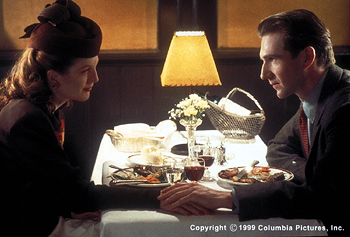![[safe]](safe.gif)

The End of the Affair

Starring Ralph Fiennes, Julianne Moore, Stephen Rea, Ian Hart
Directed by Neil Jordan
![[safe]](safe.gif)


How do you make a film about love, obsession and religion based on a famously unfilmable Graham Greene novel?
If you're Neil Jordan, you proceed with great caution and respect, and somehow, with the aid of stellar talent in front of and behind the camera, create a work of stunning strength and dignity which retains the troublesome aspects of the original work (true love, obsession, religion) while opening it up for the screen.
The story of a selfish writer and his passionate, doomed affair with a married woman, "The End of the Affair" is the kind of unfashionable, air-less chamber pieces that are largely hit or miss with the Academy come this time of the year. Carefully crafted with an eye to detail, this engaging drama is particularly appealing because of its uncompromising approach to a difficult subject matter.
Obsession, by its very nature, is virtually impossible to gracefully translate onscreen because it is such a forceful, yet largely internalized, emotion. Greene's novel, which relies on overlapping narratives and is heavy on religious overtones, is given a handsome treatment by Jordan's script, which doesn't shy away from its more difficult aspects, but in fact, enhances the depth of meaning by peeling back the layers and laying bare all of the story's contradictions and the truth of humanity that underlies all of the characters and their motivations.
Set in the years before and after World War II, the story begins with Maurice Bendrix (Ralph Fiennes) writing his "diary of hate". Exactly who or what is the subject of his scorn and vilification becomes increasingly mysterious as the film goes on. Introduced by a sleepy, boring diplomat Henry (Stephen Rea) to his restless wife Sarah (Julianne Moore), Maurice instantly develops an all-consuming ardor for her. When his overtures are returned, the two embark on the kind of passionate, tumultuous affair that burns out even the most brazen of adulterers. However, Maurice and Sarah aren't just your run-of-the-mill lovers - so hopelessly in love are they, even a bomb that decimates their love nest and mortally wounds Maurice cannot separate them. When Sarah vanishes without a trace from Maurice's life without explanation, his obsession grows as he tries to discover the identity of – he is convinced – her new lover. Unfortunately for all involved, this happens to be the ultimate love triangle, between Maurice, Sarah and, most intriguingly, God.
Obviously, this is the kind of story most filmmakers never even contemplate tackling, let alone succeed in. Neil Jordan scores points for simply trying. Thankfully for the audience, his screenplay is a faithful, scrupulous adaptation with minor changes that add to, or at least do not detract from, the original source material. As director, Jordan lovingly frames his film with care so that the minutiae of these peoples' lives becomes as much a part of their psyche as their words and deeds. His treatment of his cast is also superlative.
Jordan regular Stephen Rea, in the most thankless role of the dull husband, does solid supporting work. Of course, in a film like this, the two stars shine. No one else seems capable of projecting angst and agony and ecstasy all at once with the same intensity and longing that Ralph Fiennes brings to every project. His Maurice is a man driven almost mad with jealousy and love who turns all his passion toward hating the very object of his desire. Likewise, Julianne Moore carefully plays a very contrary character – the pious adulteress – with amazing dexterity. Her ability to draw audiences into her two very conflicted and opposite frames of mind is but one of this talented thespian's many gifts. Together, Fiennes and Moore combust on screen much more erotically and effectively than Fiennes did with Kristin Scott Thomas in "The English Patient" – and that is very high praise indeed.
"The End of the Affair" is a very serious-minded,
sumptuously mounted chamber piece whose pleasures
deepen as it progresses. In a season full of
over-hyped "Oscar contenders", this quiet, strong and
relentlessly honest film is the one that truly
deserves to be seen.